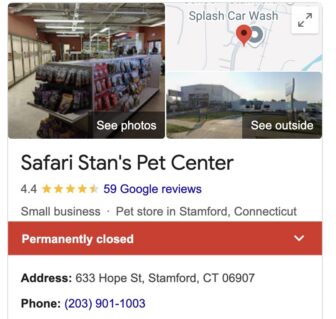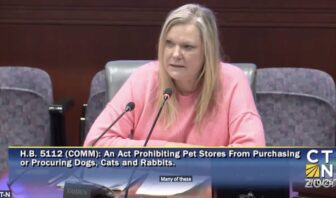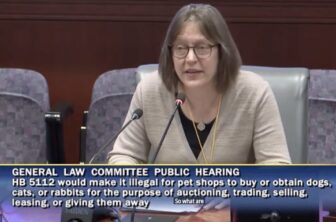On Monday the Connecticut General Assembly’s General Law Committee held a hearing in Hartford that included testimony on HB 5112, “An Act Prohibiting Pet Stores from Purchasing or Procuring Dogs, Cats and Rabbits.”
The bill pitted non profit rescue volunteers against pet shop owners.
“This committee, because we’re hearing contradictory testimony, we’ll have to get to the bottom of what’s accurate with these statements.” – State Rep Gary Turco (D-27)
 Amy Morrin Bello (D-28) Wethersfield, co-sponsor of the bill, said she was not trying to shut down pet shops, but rather prohibit them from selling cats, dogs and rabbits sourced from commercial breeders.
Amy Morrin Bello (D-28) Wethersfield, co-sponsor of the bill, said she was not trying to shut down pet shops, but rather prohibit them from selling cats, dogs and rabbits sourced from commercial breeders.
She said the bill included language to allow a pet shops to work with shelters and rescues on adoption events.
Bello noted there were thriving pet stores that don’t sell animals, but work with rescues and shelters on adoption events and then sell new owners pet food and gear. She said pet shops that don’t sell dogs, cats and rabbits also thrive by selling products and quality services including grooming, training and boarding.
Also Rep Bello said there was some urgency to the proposed legislation because in December 2024 the state of New York recently banned the sale of dogs, cats and rabbits, resulting in pet shop owners looking for locations in Connecticut.
She noted that other states banning these sales were CA, MD, ME, WA, IL, OR and VT, in addition to hundreds of cities across the country including Chicago, Boston, Philadelphia, El Paso and Austin who have also implemented bans.
Bello submitted HB 5112 with State Representative Gary Turco (D-27) in an attempt to slow the influx of puppy mill dogs into the state of Connecticut.
“A good breeder won’t be selling animals through brokers to pet stores, or directly to pet stores. Good breeders are selling them directly to families to ensure proper placement and that they’re able to meet with the people who are going be owning their dogs,” Bello said.
“According to the HSUS, the USDA licensing does not mean a facility is humane,” Bello said. “In 2024, documents showed breeders with numerous and egregious violations spanning years were still licensed by the USDA. The USDA lacks the sufficient inspection capabilities to inspect more than 8,000 pet dealers, exhibitors and research facilities.”
Bello said health records for interstate transfers reveal that thousands of puppies were imported to Connecticut pet stores from midwest puppy mill breeders and brokers since 2021.
Brokers are middlemen – companies that re-sell puppies bred by another business.
“Many of these puppies were purchased from massive Missouri, Ohio and Iowa-based brokers, not directly from breeders,” she said.
 Togi Kuttamperoor, owner/operator of the Safari Stan’s Pet Center in New Haven, said misinformation was circulating.
Togi Kuttamperoor, owner/operator of the Safari Stan’s Pet Center in New Haven, said misinformation was circulating.
Kuttamperoor said that as the result of the work of a 2014 task force in Connecticut, a law was passed preventing pet shops buying from “hobby breeders,” allowing them to only buy from USDA licensed commercial breeders.
“With that came a lot of regulations. We’re not just licensed, we are also told how to operate and we are inspected regularly, after a complaint or yearly.”
Kuttamperoor said there were also requirements for veterinary care and customer access to information about where the puppies come from.
Mr. Kuttamperoor said previously he had two locations, but closed down his Stamford location.
“I shut down the store in Stamford because we were getting harassed, and I had a lot of young staff – teenagers – that were getting harassed by people,” Kuttamperoor said.
“Animal rights people?” Turco asked.
“Yes, but I’d rather not discuss that,” Kuttamperoor said.
As for the suggestion he not sell liver animals, Kuttamperoor said he could not compete with Petco or Petsmart, much less Chewy or Amazon.
“We are just one store and our buying power is not as great as all these big box chains,” Kuttamperoor said.
“We have zero complaints. We don’t have any problems from our consumers. We take back our puppies. We have a program that educates people about puppy ownership. It’s not a one minute process, it’s a three hour process.”
Tracey Ober from the American Kennel Club testified against HB 5112, saying the State Dept of Agriculture data indicated that rescue groups had brought over 41,000 animals to CT from other states in the US, including dogs she described as “feral” or semi feral” from Turkey, China, Egypt, Korea and Slovenia between 2021 and 2024.
“We know that dog owners frequently want a particular breed of dog because of its predictable size, temperament, grooming needs and instincts, and the wait list for a puppy from a reputable pure bred breeder is typically 2-3 years,” she said. “When consumers cannot obtain the pet they want from licensed and inspected entities, they are at significant risk of online scams.”
She said in her group’s experience and observation, banning pet stores from selling pets did not result in strengthening the enforcement in other states where pets might be acquired.
Rather, she said warned, as a result of the ban, prospective pet owners would get scammed online by “bad actors” where they get scammed for an animal that does not exist or receive a sick animal.
State Rep Gary Turco (D-7) for Newington and New Britain said he had been shocked to see AKC on the list to speak against the legislation.
“I am kind of shocked, when I saw AKC was on here. I was interested in what AKC would have to say because I would think they would want to protect animal safety as much as possible,” Turco said. “But just doing a quick Google search I see AKC seems to have recent history in opposing a lot of state laws to strengthen protection of animals, or hold individuals responsible for abuse of dogs.”
“I don’t really know AKC like I thought I did,” Turco said.”We heard testimony today that no reputable breeder would sell their dogs to a pet store to be sold in a retail shop.”
Ober acknowledged that AKC does charge fees to register dogs including ones from pet shops, but that it was a small amount.
Marlene Wilhelm, president of the rabbit rescue, House Rabbit Connection, said that many pet stores get rabbits from commercial breeders at Easter.
She said her group had paid for highway billboards saying that rabbits were lifelong commitments, not appropriate holiday gifts.
Wilhelm said she supported 5112 because just like every time a new version of 101 Dalmatians is released and demand for Dalmatians soars, the same happens every Easter with demand for rabbits.
CT Breeder pet shop owner Gary Nudelman with a store in Norwalk, said much of what he’d heard during the hearing was not true.
Rep Gary Turco, said, “This committee, because we’re hearing contradictory testimony, we’ll have to get to the bottom of what’s accurate with these statements.”
“We want to protect consumers from pets that are coming from out of-state, large breeding facilities,” Turco said. “And we want to make sure the animals being brought in are healthy and being treated in humane ways.”

Gary Nudelman of CT Breeder in Norwalk and Newington
Rep Turco asked Nudelman what measures he took to make sure that the breeders in Iowa or Missouri, for example, were reputable.
Nudelman said his “puppies come from licensed, inspected breeders who exceed USDA standards, many of them we’ve worked with for decades.”
Nudelman said large breeding facilities exist, but a lot of them were unlicensed, and besides, he was not allowed to buy from facilities with violations anyway.
“The question of have I been to them? Yes, I have been to them on several occasions and I met them. They literally will come to Connecticut and we take them to Greenwich and we show them our neck of the woods.”
He said the breeders he sourced from were “not what you’re hearing – not this filthy thing.”
Nudelman said rescue groups were making pet shop owners out to be “a villain” so they could be heroes.
“And the dogs they are rescuing aren’t local. They’re bringing them in from other states,” Nudelman said. “It’s a billion dollar industry. HSUS I think, one penny goes to the dogs and 99¢ for the rest of their thing,” he said.

Kristen Roeckle from Greenwich, who is on the Lucky Dog Refuge advisory board
Greenwich resident Kristen Roeckle and Lucky Dog Refuge advisory board member testified in support of the law.
“The research does not lie, people do,” she said.
“It is proven that the pet store to puppy mill pipeline exists and has been documented by many humane organizations,” she said. “Puppy mills are are inhumane, profit-driven commercial dog-breeding facilities that ignore animal welfare.”
Roeckle said approximately 90% of pet store companion animals come from these puppy mills and factories.
She said a puppy named “Ross” was sold from Smart Puppies to a family with breeder paperwork that seemed legitimate, but was so sick that his family could not afford to take care of him and surrendered him to Lucky Dog Refuge for lifesaving medical care.
“After looking at that breeder paperwork, he was actually sourced from a terrible puppy mill that lands on the worst-100 list every year. Specifically this puppy mill within Oberlin, Ohio, named Creekside Kennels,” she said. ”
“Pet store puppies do not come from ethical breeders,” Roeckle said. “To be an ethical breeder you must vet the person and the home.”
She said it was a myth that pet stores sell to responsible and prepared buyers.
“They are not required to vet their buyers in a uniform or diligent way. They simply sell to people with a credit line.”
And she noted the previous speaker’s website featured a link to a credit union application.
“If puppies are not able to be afforded in full by those buyers, are they really preparing for the lifetime cost of a puppy, or are we capitalizing on cuteness?” Roeckle asked.

Jennifer Walker from Muddy Paws
Jennifer Walker from Muddy Paws said the legislation was critical to shutting down the cruel pipeline from large scale breeding operations commonly known as puppy mills, to pet stores in Connecticut.
“Puppy mills prioritize profit over animal welfare. These breeding facilities are notorious for the horrific conditions. Dogs are confined to tiny wire cages, denied proper veterinary care and are bred repeatedly until their bodies give out,” walker said. “They often suffer from malnutrition, untreated infections, genetic disorders and extreme psychological distress. Many of these facilities are perfectly legal, despite the fact the conditions would be considered abusive in any other setting.”
Walker said the consequences of these practices were that consumers who purchase a sick or behaviorally challenged animal find themselves unable to take care of them, and too often these dogs and cats are surrendered to already overwhelmed shelters and rescues, or worse, abandoned.
“Instead of enabling the mass breeding and sale of more animals, we should be working to support responsible pet ownership, spaying and neutering, and adoption from reputable breeders and rescue organizations.”

Annie Hornish
Annie Hornish, Connecticut State Director of The Humane Society of the United States said at least three former NY puppy stores, all with terrible records, had already moved over the border into Connecticut.
Hornish said responsible breeders never sell to pet shops.
 Chris Carty of The Dog House in Manchester said his puppies come from responsible USDA licensed breeders that are inspected at least once a year.
Chris Carty of The Dog House in Manchester said his puppies come from responsible USDA licensed breeders that are inspected at least once a year.
“We carefully monitor those inspection reports very closely,” he said. “Our puppies receive weekly veterinary exams, all the necessary vaccinations, a high end food, and are cared for by our experienced staff. In cases where a pet needs extra attention our caring staff members will even take them home.”
He said many satisfied customers return for a second, third and fourth dog.
Carty said he had a unique perspective on pets from pet stores and pets from rescues and shelters, given that in 2018 he founded a dog and cat rescue that worked with high-kill shelters and other rescues from states such as Virginia, Tennessee and North Carolina, and personally volunteered at a shelter in Virginia where he witnessed first-hand the challenging conditions many of these animals come from.
“A common argument against pet stores is that our puppies are typically sick or are not well cared for, but this is far from the truth,” he said, adding that customers benefit from health warrantees that protect the pet and the family.
“A lot of the shelter and rescue pets unfortunately are not required to receive the same standard of care. Shelter pets typically have no medical history, and have health and behavioral issues and unfortunately we see these animals returned to the very same shelter they were adopted form.”
“As the owner of a pet store, my association with the rescue began to have a negative effect on the rescue, so I literally turned the operation over to one of my staff,” Carty said. “If my mere association as the owner of a pet store with the rescue that I founded had a negative effect on the rescue what assurances are there that the rescue would even work with a store as this bill proposes?”
 Tara Fleming who opened A to Z Pet Store (Derby) in 2011 with her mother, said customer choice was paramount.
Tara Fleming who opened A to Z Pet Store (Derby) in 2011 with her mother, said customer choice was paramount.
“Every single consumer and customer has their own needs that is hard sometimes to be met. I have worked with a lot of children with special needs or anxiety and need a specific type.”
She said her company will always take a dog back into the store, if for example, the consumer move and could not take the dog with them.
“We always swill welcome it back into the store,” she said. “We have a lot of customers who have moved and couldn’t keep their animals. We always take them back. Very rarely or ever do our animals end up in a shelter or rescue due to them not being able to keep it. We always want it back so that we find can find another great home for that animal,” Fleming said.
See also: